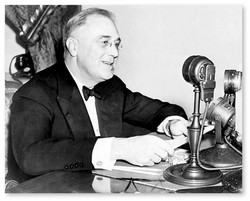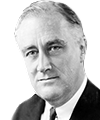FDR Address
|
| updated |
Copy Link Code
|
 One of President Franklin Roosevelt's strongest talents was that of orator; he is often referred to as the greatest speechmaker America has ever produced. Roosevelt's addresses were always geared toward his audience and the topic at hand; he was often an informal speaker who spiked his speeches with wit and sarcasm when a topic demanded it. President Roosevelt always made his millions of listeners feel as if he were speaking specifically to them. Three of his most important speeches prove these points.
One of President Franklin Roosevelt's strongest talents was that of orator; he is often referred to as the greatest speechmaker America has ever produced. Roosevelt's addresses were always geared toward his audience and the topic at hand; he was often an informal speaker who spiked his speeches with wit and sarcasm when a topic demanded it. President Roosevelt always made his millions of listeners feel as if he were speaking specifically to them. Three of his most important speeches prove these points.
Franklin Delano Roosevelt's first inaugural address
From the steps of the U.S. Capitol in Washington, D.C. on March 4, 1933, FDR delivered his first presidential address to a nation and a world that was still mired deep in the effects of the Great Depression. Through this speech, President Roosevelt offered his platform for addressing the most important issues facing post-war America, as well as encouragement for a bright future for the people and the nation. Some of his most important points were:
- Employment: President Roosevelt suggested that the government directly recruit and hire workers in order to restore the diminished economy and promote private enterprise. In 1935, the Works Progress Administration (WPA) was established as the agency responsible for managing this program.
- Material wealth: President Roosevelt encouraged Americans to be proud of their work, but not greedy with their wealth. "Happiness lies not in the mere possession of money; it lies in the joy of achievement, in the thrill of creative effort," he told the gathered crowd.
- Constitutional government: Roosevelt ensured the people that only a constitutional form of government would sustain a nation through the conflicts, expansions and internal strife that had already tested the durability of the United States.
- America's future: Franklin Roosevelt assured the people they had not failed and that he recognized their mandate for him to take "...direct, vigorous action" and to provide "...discipline and direction under leadership." Roosevelt's speech implored America to believe that "...the only thing we have to fear is fear itself."
The "Four Freedoms" Speech
In President Franklin Roosevelt's State of the Union speech in 1941, the subject of freedom was explored. It has been lauded as the most famous political speech about freedom in the twentieth century.
At the time, much of Europe was under attack by the German Army, and many in America felt that isolationism was the best course for the nation, that the United States should not become involved in the escalating war. But, Roosevelt disagreed; he felt that Britain needed the nation's support, because in doing so, the U.S. would be fighting for the following universal freedoms:
- The freedom of speech and expression, everywhere in the world
- The freedom of every person to worship as they choose, everywhere in the world
- The freedom from want - to ensure that people have financial stability, everywhere in the world
- The freedom from fear of war - that no nation would commit physical aggression against another nation, anywhere in the world
President Roosevelt's Four Freedoms speech symbolized the nation's war objectives as the U.S. entered World War II. Today, it is the still the hope, because the scores of men who fight the wars do so in the name of these freedoms.
Fireside Chats
During thirty radio addresses, called "fireside chats," President Franklin Roosevelt established a line of direct communication with the American people. These chats provided Roosevelt the opportunity for the presidential duty he enjoyed the most: Connecting with the people. His cheeriness and pleasant personality gained him the favor of the people, making him one of the most popular presidents in American history. Through this media outlet, President Roosevelt's speeches allowed him to explain his plans for social change in a way the people understood, and they gave him an opportunity to keep the people abreast of issues around the world.
Roosevelt's addresses centered on subjects that he felt the people considered important to them and to their country. These speeches included such topics as his New Deal program, the Works Relief Program, economic conditions and the Declaration of War with Japan. Roosevelt's speeches were listened to by more people than any other program on radio at the time.
President Roosevelt's fireside speeches eliminated the press and their interpretation of his messages. Such closeness to the people made them feel as if they were involved in the decisions that affected them. Moreover, Franklin Roosevelt's fireside chats gained the trust of the people allowing him to make the most sweeping social overhaul in history while avoiding dissent from the majority of those he governed.
